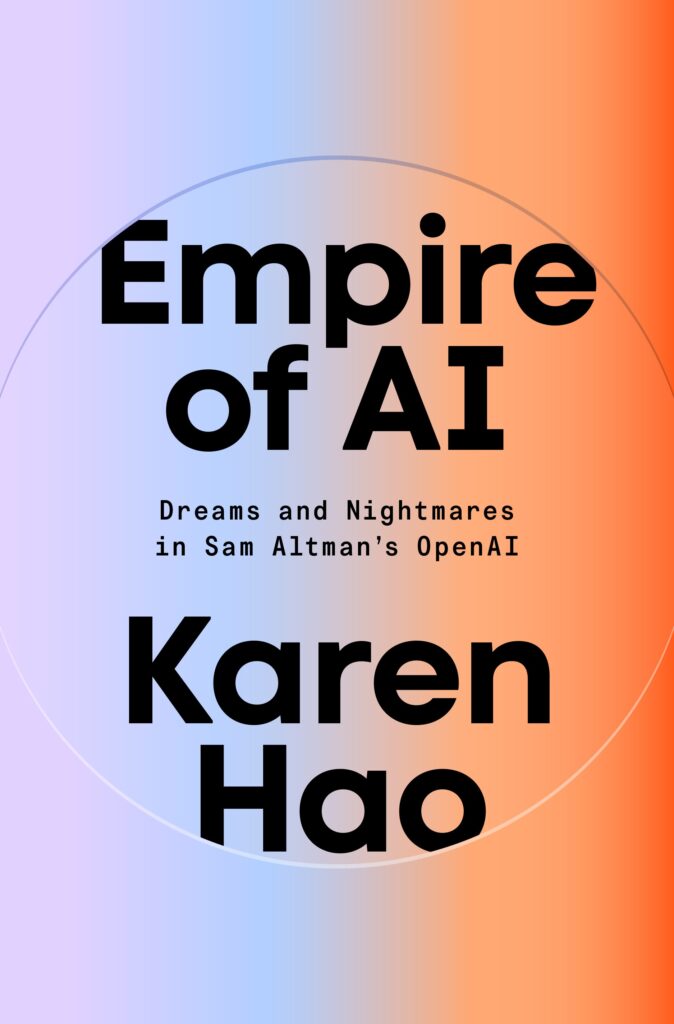Whether you embrace artificial intelligence or not, it seems almost mystical in its abilities—despite the fact that it was created by humans. It can also feel unreal that asking ChatGPT to write an email actually reflects billions of dollars, millions of gallons of water daily, and countless jobs being streamlined out of existence. Award-winning journalist Karen Hao wants you to understand the full implications of the AI tools we have and the ways that industry leaders are shaping our future from within a vacuum of power and neocolonialism.
In Hao’s new book, Empire of AI: Dreams and Nightmares in Sam Altman’s OpenAI, she makes the case that the AI industry is akin to European colonialism in the ways it has “seized and extracted resources … and exploited labor of the people they subjugated … for the empires’ enrichment.” She backs this up by recounting abuses of power impacting individuals and communities, balancing the horrors with dark humor and thoughtful calls to action. Hao also details AI’s far-reaching impacts, from systemic racism and privacy issues to stark environmental concerns and psychological abuse, gaslighting, exploitation, and the silencing of voices calling for industry accountability. All told, Empire of AI is a deeply researched, page-turner of a book.
“I started thinking about a book in mid-2022,” Hao says. “I had just written a series with MIT Technology Review called ‘AI Colonialism’ about this idea and wanted to explore it further. The arrival of ChatGPT in late 2022 finalized the decision for me. I realized there was so much missing context in the public discussion about what AI is, how ChatGPT works, and who it came from—all necessary for understanding what this technology would mean for our future.” She adds that ChatGPT also “represented a vision of AI development that made the neocolonial dimensions of the AI industry so much worse. So it became clear to me, through discussions with my amazing agent, that this was the book: braiding OpenAI and ChatGPT’s story with a broader argument about the empires of AI.”
In Empire of AI, Hao weaves together threads of ambition and power to explore how OpenAI—founded to support social good and transparency—grew into something very different, taking the entire AI industry with it by consolidating funding around a very specific approach to artificial intelligence. “Nothing about this form of AI coming to the fore or even existing at all was inevitable,” says Hao about ChatGPT. “It was the culmination of thousands of subjective choices, made by the people who had the power to be in the decision-making room.”
An MIT graduate, Hao worked as a Silicon Valley application engineer prior to becoming a journalist. She skillfully weaves that into the book, commenting on the tech sector’s impacts on San Francisco’s Bay Area through gentrification and displacement—tactics at home that are not unrelated to the AI industry’s colonialism abroad. Hao, who leads the Pulitzer Center’s AI Spotlight Series in training other journalists how to cover artificial intelligence, was also a senior editor for AI at MIT Technology Review and featured on the TIME100 AI 2025 list.

Empire of AI was informed by “over 300 interviews with around 260 people and an extensive trove of correspondence and documents.” Sam Altman, Elon Musk, and Peter Thiel show up, but so do data workers in Venezuela, Uruguay, and Kenya, whose lives—and livelihoods—aren’t as well known. These are some of the people who help train AI by identifying what it should and shouldn’t be seeing and doing—that could be videos training self-driving cars to avoid pedestrians or filters to block sexually explicit materials within AI. Rather than experiencing the trickle-down effects of tech investments, these workers are exploited by the systems they help make possible.
In the book, Hao writes, “Artificial intelligence doesn’t need to accept the logic of unprecedented scale and consumption to achieve advancement and progress. So much of what our society actually needs—better health care and education, clean air and clean water, a faster transition away from fossil fuels—can be assessed and advanced with, and sometimes even necessitates, significantly smaller AI models and a diversity of other approaches.” She suggests it’s a failure of imagination that has gotten us here, but Hao ends the book on a brighter note, offering examples of ways to refuse, interrogate, and reimagine AI.
“Since the release of my book, the empires of AI have only grown more powerful,” Hao says. “They’re spending hundreds of billions to develop and deploy their models with no end in sight to the extraordinary cash burn. They’re talking about building supercomputers the size of Manhattan that would also match the city’s energy demands. They’ve allied themselves with the Trump administration, turning the last nation-state government capable of holding them accountable, into a puppet that does their bidding.”
She continues, “There is so much work to be done to contain the empire, stop their seizure of power, stall and reverse their threat to privacy, art, jobs, education, democracy … We need to do more … Information is power. And the more that I can support informing as many people as possible about what these empires of AI represent, the more their power redistributes back to the people.”






